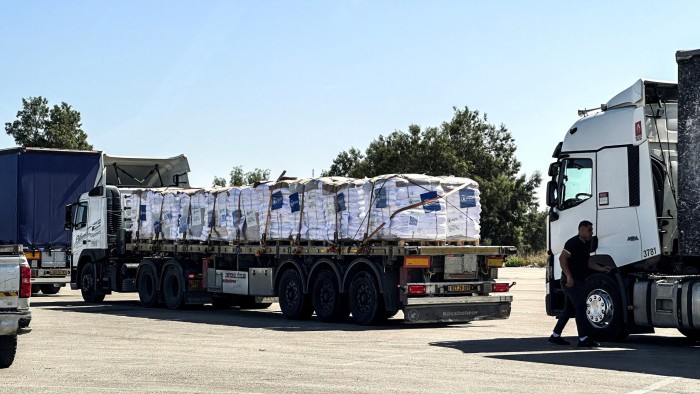Share this @internewscast.com
Unlock the Editor’s Digest for free
The leader of a relatively unknown private group that was set to manage aid deliveries to Gaza has stepped down. He stated that the US and Israeli-supported plan would struggle to maintain humanitarian standards.
Jake Wood, who was the executive director of the Gaza Humanitarian Foundation—a little-known organization based in Switzerland—was preparing to take over from the UN and other agencies in facilitating vital supplies to the devastated region.
Wood, a US marine veteran who previously led the disaster relief organization Team Rubicon, expressed in a statement on Sunday night that he felt “proud” of his work over recent months. He had been developing a “practical plan” to provide food to hungry people in Gaza, prevent the militant group Hamas from misusing aid, and enhance the efforts of other international groups already active in the area.
“However, it is clear that it is not possible to implement this plan while also strictly adhering to the humanitarian principles of humanity, neutrality, impartiality, and independence, which I will not abandon,” he said.
Under the GHF plan, individual Gazan families would travel to receive boxed meals every week from distribution hubs secured by US private security contractors and the Israeli military.
The UN, long the principal provider of aid to Gaza, has condemned the arrangement as a “fig leaf” for the forced displacement of the local population, primarily to southern Gaza where most of the hubs are to be located, and have refused to take part in the scheme.
Israeli military officials and other western officials have also privately criticised the plan as insufficient to remedy the catastrophic humanitarian situation in the war-torn enclave.
They have also raised concerns about the ability of private contractors to maintain control at hubs intended to provide aid to some 300,000 people in a territory the UN has warned is on the verge of starvation.
Wood’s resignation adds to concern about the scheme’s viability, as several people familiar with GHF’s plans had already raised doubts over aid provision and funding.
Nevertheless, in a statement released early on Monday, the GHF board said they “will not be deterred” and that the first aid deliveries would begin later in the day. The board said it planned to reach “over one million Palestinians by the end the week”.
Hundreds of foreign security contractors have arrived in Israel over the past week ahead of their planned deployment into Gaza to guard aid convoys and the distribution centres.
An Israeli official said three of the initial hubs would be opened in southern Gaza, with an additional hub established in the central part of the strip.
Israel had halted all aid deliveries, including food and medicine, into Gaza for much of the past three months in an effort to increase pressure on Hamas in long-stalled ceasefire talks. The move has compounded a humanitarian catastrophe for the 2mn people in the enclave.
Under growing international pressure, Israeli Prime Minister Benjamin Netanyahu last week began allowing the entry of what he called “limited” aid into the enclave according to the old UN-led model, as a “bridge” to the start of the GHF scheme.
Yet only 100 trucks a day, on average, have been allowed in so far according to Israeli military figures — an amount UN secretary-general António Guterres, said on Friday was “a teaspoon of aid when a flood of assistance is required”.






